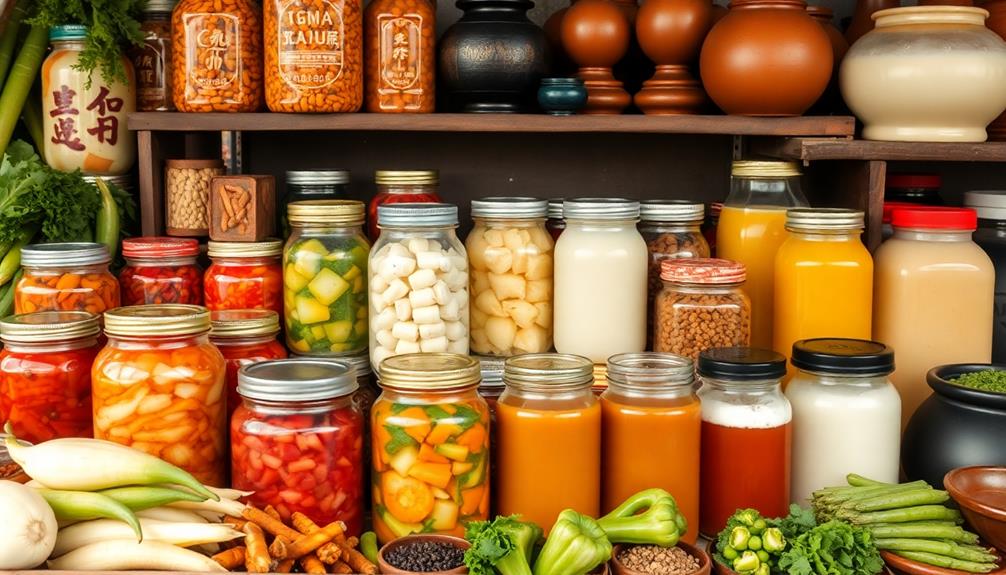Many cultures prioritize fermented foods because they offer significant health benefits and reflect deep-rooted traditions. Fermented foods boost gut health, improve digestion, and enhance nutrition by making vitamins more accessible. They also connect communities through shared practices and rituals, like kimchi in Korea or dosa in India. Additionally, these foods play a role in cultural identity, offering a sense of heritage. The consumption of fermentation-rich diets has even been linked to better mental well-being and reduced inflammation. If you're curious about specific examples and the future of these foods, there's plenty more to discover!
Key Takeaways
- Fermented foods enhance gut health, which is vital for overall well-being in many cultures that prioritize digestive health.
- Cultural heritage and community practices, such as kimchi in Korea, integrate fermentation into traditional diets.
- Fermentation serves as a preservation method, ensuring food security and nutrition during harsh seasons, particularly in Scandinavian countries.
- Spiritual and religious significance often accompanies fermented foods, like dosa and idli in India, linking diets to cultural rituals.
- The nutritional benefits, including improved immune function and bioavailability of vitamins, drive the preference for fermented foods in various cultures.
Importance of Fermented Foods
Fermented foods play an essential role in your diet, offering a wealth of benefits that can enhance your overall well-being. These probiotic foods are packed with live microorganisms that promote gut health, helping you maintain a balanced microbiome.
The process of fermentation not only preserves food but also enhances its nutritional value, making vitamins and minerals more accessible for your body. For instance, traditional fermented foods often contain increased levels of B vitamins and vitamin K, vital for your health. In many cultures, such as Chinese cuisine, fermented ingredients are integral to dishes like Red-Braised Pork Belly, contributing to rich flavors and health benefits.
Regularly incorporating fermented foods into your diet can lead to various health benefits, including improved immune function and reduced inflammation. By supporting gut health, these foods can even have positive effects on your mental well-being through the gut-brain axis.
Many cultures prioritize fermented foods for their cultural significance, reflecting heritage and identity through recipes passed down through generations. Embracing these foods in your diet not only offers you nutritional advantages but also connects you to a broader cultural tradition of food preservation and appreciation.
Cultural Practices Around Fermentation
The rich tapestry of cultural practices surrounding fermentation showcases how food preparation techniques can reflect a community's heritage and identity. In many cultures, fermented foods like kimchi in Korea and miso in Japan aren't just diet staples; they embody centuries of culinary traditions.
These traditional methods reveal significant cultural importance, often tied to community practices and celebrations. For example, kimchi isn't merely a side dish but a staple that enhances meals and serves as a cultural symbol in Korean cuisine, where traditional side dishes (banchan) play a central role in dining.
In Scandinavian countries, fermentation serves as a crucial preservation technique for fish and dairy products, ensuring nutrition during harsh winters with dishes like surströmming and yogurt.
Similarly, in Mexico, the fermentation of beverages like pulque highlights the intersection of food with cultural rituals and social gatherings.
In India, foods like dosa and idli not only deliver unique flavors but also play an essential role in religious observances, showcasing food's spiritual dimension.
These fermentation processes are frequently passed down through generations, preserving family heritage and cultural knowledge. This shared history enriches the culinary landscape, emphasizing how fermentation connects you to your roots and enhances the identity of diverse communities worldwide.
Health Benefits of Fermented Foods
Incorporating fermented foods into your diet can greatly boost your overall health. These foods are rich in probiotics, which enhance gut health by promoting a diverse microbiome and improving digestion.
Traditional Ethiopian beverages like Tella and Tej are excellent examples of how fermentation plays an essential role in enhancing flavors while contributing to health benefits. Regular consumption can lead to significant benefits, including:
- Lower risks of chronic diseases like obesity, diabetes, and cardiovascular disease.
- Increased bioavailability of nutrients, making vitamins like B12 more accessible, especially in plant-based diets.
- Improved immune function and reduced inflammation due to the presence of live microorganisms.
- Positive effects on mental health, potentially alleviating symptoms of anxiety and depression.
The fermentation process not only enriches the flavor of foods but also maximizes their health benefits. By embracing fermented foods, you're not just enjoying delicious flavors; you're also investing in your gut health and overall well-being.
The probiotics found in these foods work wonders for digestion and may even help you maintain a balanced mood. So, whether it's yogurt, sauerkraut, or kimchi, incorporating these nutrient-packed options into your meals can lead to healthier, happier living.
Don't miss out on the profound impact these foods can have on your health!
Global Varieties and Examples
Exploring the world of fermented foods reveals a rich tapestry of global varieties and examples that showcase their cultural significance and culinary diversity. In Korea, you'll find kimchi, a staple that embodies both tradition and flavor, while Japan boasts miso, a versatile ingredient integral to many dishes. These fermented foods reflect each culture's methods of preservation and their deep roots in traditional cuisine, much like how Brazilian cuisine incorporates traditional dishes that highlight diverse ingredients and cultural influences.
Traveling to Sweden, you might encounter surströmming, a fermented herring dish celebrated as a cultural delicacy, highlighting Nordic fermentation practices. In India, staples like dosa and idli, made from fermented rice and lentils, enhance flavor and digestibility, demonstrating the versatility of fermentation.
European kitchens often feature kefir and sauerkraut, with kefir rich in probiotics that bolster gut health, and sauerkraut providing a generous dose of vitamin C.
Fermented beverages like kombucha, tracing back to ancient China, are now enjoyed worldwide, showing how traditional fermentation methods have evolved and adapted over time. Each of these examples illustrates how fermented foods not only nourish but also connect people to their heritage and promote overall wellness.
Future of Fermented Foods in Diets
Fermented foods are poised to play a significant role in future diets as consumers increasingly recognize their health benefits.
With a growing awareness of how these foods can enhance gut health and improve digestion, you're likely to see a surge in the popularity of various fermented products. Innovations in fermentation technology make it easier than ever for home cooks and small producers to create exciting options that cater to modern tastes.
For instance, traditional dishes like Mushroom Masala can be complemented with fermented sides, enriching the meal experience.
Here are some trends shaping the future of fermented foods:
- Enhanced Market Options: Expect more diverse fermented products as companies respond to health-conscious consumers.
- Culinary Fusion: Traditional fermented foods are blending with contemporary gastronomy, leading to unique dishes rich in probiotics.
- Research-Driven Recognition: Ongoing studies are likely to solidify the nutritional advantages of fermented foods, prompting dietary guideline updates.
- Accessibility: As fermentation technology advances, you'll find it easier to incorporate these beneficial foods into your daily meals.
As you embrace these culinary trends, you'll not only enjoy delicious flavors but also reap the numerous health benefits fermented foods have to offer.
Frequently Asked Questions
Why Are People Choosing to Eat More Fermented Foods?
You're choosing to eat more fermented foods because they improve gut health, boost immunity, and enhance nutrient absorption. Plus, you enjoy the connection to traditional practices and the sustainability of using locally sourced ingredients.
Why Do Cultures Ferment Foods?
You'll find cultures fermenting foods to preserve flavors, creating tangy delights that dance on your palate. It's a way to enhance nutrition, foster community, and connect generations through shared traditions, keeping culinary heritage alive.
What Is the Importance of Fermented Food in Diet?
Fermented foods are crucial in your diet because they enhance gut health, boost nutrient absorption, and provide essential vitamins. Including them regularly can support your immune system and reduce chronic disease risks, promoting overall wellness.
What Country Eats the Most Fermented Foods?
You'll find that South Korea consumes the most fermented foods, with kimchi being a daily staple for about 95% of the population. Their love for fermentation truly shapes their culinary landscape and overall health.
Conclusion
Fermented foods aren't just a culinary trend; they're deeply rooted in culture and health. By embracing these vibrant dishes, you connect with traditions that have thrived for centuries. Imagine a colorful plate filled with kimchi, yogurt, and sauerkraut—each bite bursting with flavor and probiotics. As you explore diverse global varieties, you'll not only enhance your palate but also boost your well-being. So, why not make fermented foods a staple in your diet and savor the benefits they bring?










